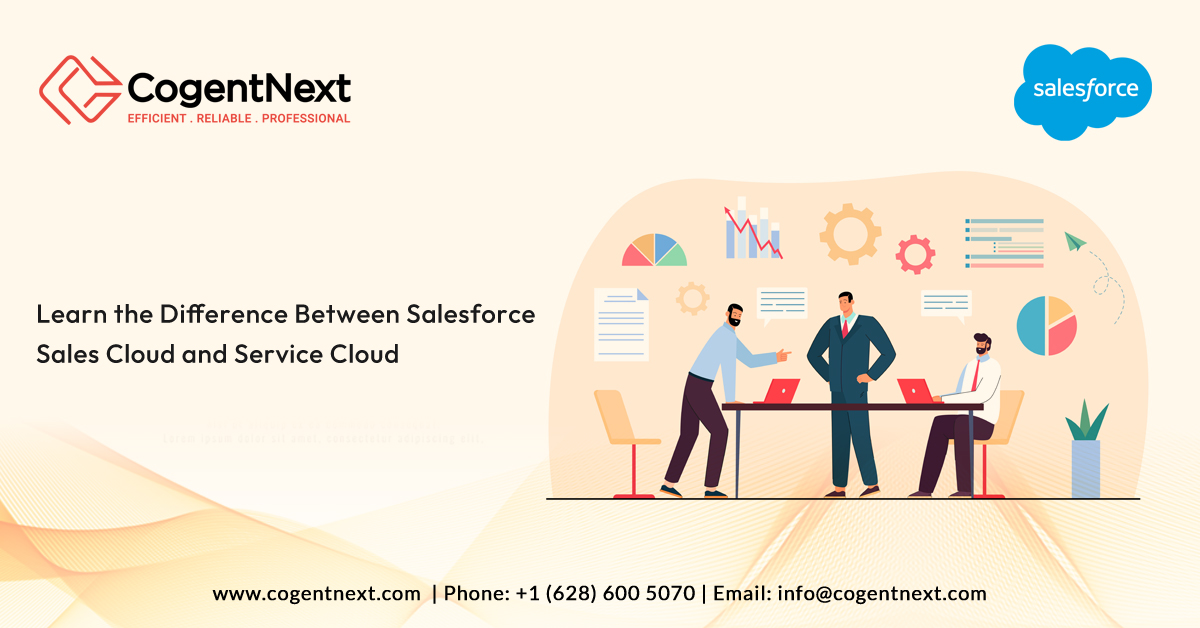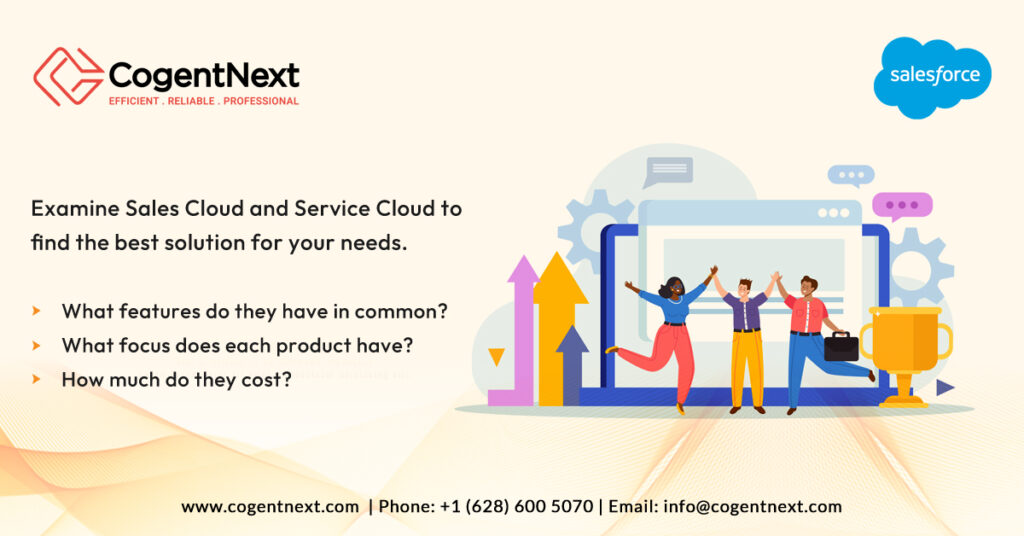
Learn the Difference Between Salesforce Sales Cloud and Service Cloud
Salesforce is one of the most popular and well-known cloud apps for customer relationship management (CRM). It helps businesses improve customer engagement, sales, and support services. However, with Salesforce’s array of offerings, it’s common for companies to wonder which path to take: Sales Cloud or Service Cloud. We’ll take a look at both options, clarifying their commonalities, distinct features, and how to choose the one that aligns with your business needs.
Choosing the right Salesforce solution is crucial for businesses looking to streamline their operations and enhance customer relationships. The confusion often arises because both Sales Cloud and Service Cloud are designed to improve customer interactions but focus on different aspects of the customer journey. Understanding the nuances between the two can empower businesses to make informed decisions that fuel growth and customer satisfaction.
What Do the Two Clouds Have in Common?
Before we explore the differences, it’s important to recognize the shared foundation of Sales Cloud and Service Cloud:
- Integrated CRM Platform: Both are built on the Salesforce platform, offering a unified CRM solution that facilitates a comprehensive view of customer interactions across sales, marketing, and customer service.
- Customization and Scalability: Each cloud service provides extensive customization options and scalability to adapt to business needs, ensuring that companies of all sizes can tailor the platform to their specific requirements.
- Salesforce Ecosystem: Users of either cloud benefit from the robust ecosystem of Salesforce, including access to AppExchange for additional functionalities, integration capabilities, and a wide range of tools for analytics and data management.
Now that we’ve gotten an overview of their shared heritage, let’s see how each solution finds its own path.

What is Salesforce Sales Cloud?
Salesforce Sales Cloud is designed to streamline the sales process, enhance productivity, and drive sales growth through:
- Lead and Opportunity Management: It offers tools to track leads from acquisition to conversion, facilitating effective management of sales pipelines and forecasting.
- Sales Automation: Automating routine sales tasks, such as data entry and lead assignment, allows sales teams to focus on building relationships and closing deals.
What is Salesforce Service Cloud?
On the other hand, Salesforce Service Cloud focuses on customer service and support, aiming to boost customer satisfaction through:
- Customer Support and Case Management: It provides a comprehensive system for tracking customer issues, managing support tickets, and delivering timely assistance.
- Self-Service Portals: Service Cloud enables businesses to create self-service portals, allowing customers to find answers to their questions, thereby reducing the load on customer service teams.
Comparing the Two Cloud Services
To clearly understand how Sales Cloud and Service Cloud cater to different business needs, let’s examine a comparison chart:
| Feature | Sales Cloud | Service Cloud |
| Primary Focus | Sales and revenue growth | Customer service and support |
| Key Features | Lead and opportunity management, sales forecasting | Case management, customer portals |
| Ideal For | Businesses looking to boost their sales operations | Companies focusing on improving customer service |
Pricing
Pricing for Salesforce Sales Cloud and Service Cloud varies based on the specific needs and size of your business. Here’s a simplified pricing chart:
| Edition | Sales Cloud Pricing | Service Cloud Pricing | Combined Pricing |
| Essentials | $25/user/month | $25/user/month | $50/user/month |
| Professional | $75/user/month | $75/user/month | $100/user/month |
| Enterprise | $150/user/month | $150/user/month | $175/user/month |
| Unlimited | $300/user/month | $300/user/month | $325/user/month |
Please note: The combined pricing represents the cost per user per month for businesses that choose to utilize both Sales Cloud and Service Cloud. This approach offers a unified solution for managing both sales and customer service processes. However, actual costs may vary based on additional customization, features, and any applicable discounts for bundled services. Always consult Salesforce or a certified Salesforce partner such as CogentNext for the most accurate and up-to-date pricing information.
How to Decide Which Service is Best for Your Business
Choosing between Sales Cloud and Service Cloud depends on your primary business needs:
- Focus on Sales: If your primary goal is to boost sales and manage the sales pipeline efficiently, Sales Cloud is the right choice.
- Focus on Customer Service: If you aim to enhance customer support and satisfaction, Service Cloud will better serve your needs.
Expert Implementation Services to Get the Most Out of Your Investment
Implementing Salesforce effectively can be a complex process, requiring deep understanding and expertise. CogentNext offers professional Salesforce implementation services, ensuring that your business leverages the full potential of Sales Cloud or Service Cloud. Our team of experts works closely with you to understand your business needs, customize the Salesforce platform accordingly, and provide ongoing support for optimal performance.
Ready to take your Salesforce implementation to the next level? Contact CogentNext today and unlock the true potential of your business.
